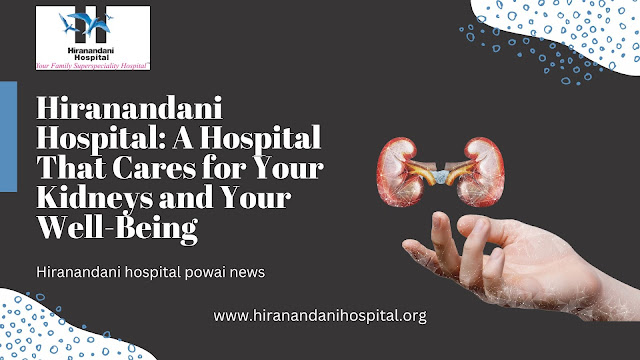Take Care of Your loved one with Kidney Disease
Educate Yourself:
The first step in providing support is to educate yourself
about kidney disease. Learn about the different types of kidney disease, their
causes, symptoms, and treatment options, says Dr Sujit Chatterjee CEO Hiranandani Hospital. Understanding the challenges and potential
complications your loved one may face; this knowledge will help you better
serve their needs and be proactive in offering assistance.
Communicate Openly: Ensure open and honest communication
with your loved one. Motivate them to showcase their feelings, concerns, and
insecurities. Proactively listen without judgment and validate their emotions.
By encouraging open communication, you can build trust, offer emotional
support, and address any specific needs or preferences they may have.
Provide Practical Assistance: Help them in their day-to-day
tasks that may become challenging due to their condition. This can include
grocery shopping, meal preparation (adhering to any dietary restrictions),
dressing or medication management, and transportation to medical appointments.
Such small acts of kindness can make a big difference in their overall well-being.
Motivate Them to Self-Care: Encourage them to prioritize
self-care. Remind them to stick to their prescribed treatment plan, including
medications, diet charts, and exercise recommendations. Motivate them to
indulge in activities they love doing, encourage stress-management techniques,
and get sufficient rest. Cushioning their self-care will contribute to their
physical and emotional well-being.
Be a Reliable Advocate: Be a strong advocate for them.
Accompany them to medical appointments at Hiranandani hospital kidney,
take notes during consultations, and ask questions on their behalf. Understand
their treatment options and help them make informed decisions. Being an
advocate ensures that their voice is heard and their healthcare needs are met.
Foster a Supportive Environment: Making the required changes
at home to meet their requirements will help to create a supportive
environment. Make sure their home is accessible, safe, and clean. Family and
friends should be asked to be tolerant and understanding. Remind them that they
are not alone on their path by providing them with emotional support and
comfort.
Seek Support for Yourself: Looking after your health as a
carer or family member is essential. Consult friends, support networks, or LH
Hiranandani Hospital's counselling facilities for assistance. Connect with
people going through comparable circumstances to share your struggles,
feelings, and insights. You can assist and care for your loved one more
effectively by taking care of yourself.
Stay Informed about Research and Resources: Keep up on new
developments and research in treating renal disease. Investigate aid groups,
internet forums, and other sites that can offer helpful advice and assistance.
Knowledge enables you to provide your loved one with the most pertinent and
current support possible.
Encourage a Healthy Lifestyle: Support them in adopting a
healthy lifestyle that promotes kidney health. Please encourage them to follow
a balanced diet low in sodium, phosphorus, and potassium. Promote regular
physical activity and help them find enjoyable ways to stay active. Please
encourage them to stay hydrated and avoid smoking and excessive alcohol
consumption.
Emotional Support:
Kidney disease can take a toll on the emotional well-being of your loved one.
Offer emotional support by being there to listen, providing reassurance, and
encouraging positive coping strategies. They may experience various emotions,
including fear, frustration, and sadness. Be patient and empathetic,
acknowledge their valid feelings, and offer support without judgment.
The Bottom Line
Supporting a loved one with kidney disease requires
compassion, patience, and a proactive approach, states Dr Sujit Chatterjee CEO
Hiranandani Hospital. You can make a significant difference in their journey by
educating yourself about kidney disease, fostering open communication,
providing practical assistance, and encouraging self-care. Remember to be their
advocate, create a supportive environment, seek support for yourself, and stay
informed about research and resources. Your unwavering support and
understanding will help them navigate their kidney disease and contribute to
their overall well-being and quality of life.
Contact healthcare professionals at
Hiranandani Hospital Kidney Transplant, support groups, and online communities for guidance and
additional resources. Together, we can provide much-needed support for our
loved ones with kidney disease and bring a change in their lives.
Take one step at a time, enjoy victories, and keep in mind
that your support matters. Together, we can uplift those facing despair, making
their journey a little easier and brighter.



Comments
Post a Comment